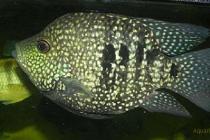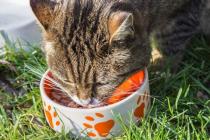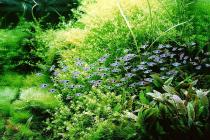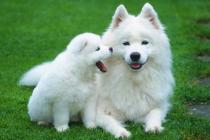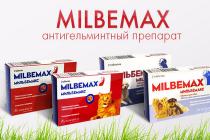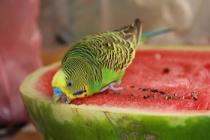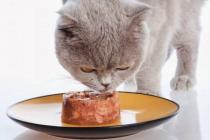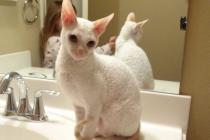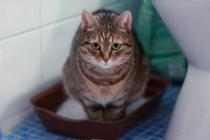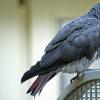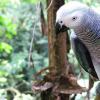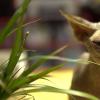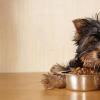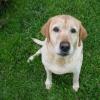Almost any pet store sells special grain mixes for parrots. It is better to choose food in transparent packaging, so you can evaluate the quality. And from opaque packages it is necessary to choose those in which the grains are stored in a vacuum (without air and other gases). Otherwise, be prepared for the fact that the products may not be of the best quality or even moldy.
If you want to combine feed yourself, use only high quality millet and oats. Grains are the basic food for birds, they determine the correct functioning of the digestive system, so the pet should always have access to them. The following ratio is recommended:
- yellow millet - 50%;
- red - 25%;
- white - 15%;
- oats (peeled) - 10%.
In the process of determining what to feed the budgerigar at home, it must be remembered that sprouted grain must be included in the diet: it contains useful vitamins E and B2. You can easily cook it yourself. To do this, put the grains on the bottom of the container (in one layer) and fill it with warm water so that it slightly covers the grains. It will be great if you can renew the liquid in the container and rinse the grain every four hours. After a couple of days, sprouts will be noticeable, they will be tiny - only 2 mm in length, but it is at this stage that the grains are most useful for parrots. Rinse and dry them before feeding.
Make sure that they do not grow moldy or overgrowth, as such sprouts lose their valuable properties.
What else can you feed a budgerigar? First of all, these are vegetables, fruits and herbs. Often, young birds are wary of such food, but if you cut vegetables and fruits into small pieces or pass them through a grater, your pet will definitely appreciate them!
Before feeding, be sure to rinse fruits and greens with running water!
- Vegetables
Parrots love them very much, and still: it is tasty and healthy! They contain many vitamins and minerals, as well as fiber, so you should include such foods in the diet throughout the year.
Vegetables such as carrots, fresh cucumbers, tomatoes, beets, zucchini, etc. will be useful for your pet. You can also feed parrots with turnips and various types of cabbage, but first you need to pour boiling water over them.
- Greens
Do not feed birds with dill, green onions, as well as tops of eggplants, tomatoes, potatoes, etc. - these greens are bad for them!
When planning what to feed the budgerigar, be careful with the parsley. It is only suitable in small quantities. But horse sorrel, arugula, celery (not roots), carrot and radish tops can and should be included in the diet! In the summer, pamper the birds with strawberries (berries and leaves will go with a bang), plantain, clover leaves and flowers, etc. Collect plants for feeding a parrot should be away from trails and plants, in areas with clean healthy soil.
You can also add spinach to the diet, but not much, even if the bird does not have renal pathology.
If you have indoor plants or flowers in bouquets in your home, don't let the parrot eat them: they are dangerous!
To prevent your pet from experiencing a shortage of greenery in the winter months, you can grow cereals and vegetables at home right on the windowsill. It's easy, and the benefits will be huge!
- Fruit
Among other things, budgies should be fed at home with fruits and berries. It is recommended to include in the diet bananas, apples and pears (pits and cores must first be removed), peaches, pineapples, kiwi, peeled oranges, tangerines and lemons, as well as some grapes. Of the berries, pitted cherries, raspberries, strawberries, wild strawberries will be useful. You can also feed your pets with melons and watermelon, but better in the summer season.
In the winter months, include dried fruits in the parrot's diet: raisins, dried apricots (steamed), dates, etc., as well as frozen berries, for example, lingonberries and blueberries are useful.
You cannot feed the birds with persimmon, mango, papaya, avocado, or any nuts!
You can already see how varied the diet is, but that's not all! They will be happy to taste porridge, boiled or steamed in boiling water. It should only be cooked in water; oil, salt and sugar should not be added. Use only high-quality cereals, and never feed your parrot with instant porridge, it contains additives harmful to birds.
The last key point in the question of what you can feed budgies is mineral feeding, which should always be freely available in the pet's cage. So what is it like and what is its use? For example, chalk saturates the body with calcium, mineral stones containing iodine and seaweed provide useful trace elements, sepia is used by parrots to sharpen their beak, organic sand allows you to control the state of the digestive system (it should be given no more than once a week), etc.
Choose only special high-quality feedings and in no case use inorganic sand, this will harm the bird!
Ready-made, high-quality, balanced bud food is another way to organize your ideal diet. Their composition is carefully selected for the needs of the pet, and you will not need to purchase additional vitamins and mineral supplements.
So, now we know what to feed the budgerigar, what you can and cannot eat. If you want to please your pet with a new treat, but you do not know if you can give it, or if you have questions regarding mineral feeding, be sure to consult with a specialist!
Now it may seem that there is a lot of information and it is easy to get confused in it, but in practice you will easily assimilate it. May your parrot always be full and happy!
In order for your budgerigar to live a long and happy life, you need to take care of its proper nutrition. These birds are very unpretentious, and food is inexpensive for them, however, there are certain rules, following which, your feathered friend will remain in excellent physical shape, cheerful and cheerful.
Many novice poultry farmers know that budgerigars eat, but they cannot always choose the right food, calculate the amount of food and feeding.
The basis of the budgerigar's diet is, of course, a grain mixture. You can compose it yourself, or you can buy a ready-made one, to which all the necessary vitamins and minerals are added.
This daily diet should include:
- millet of different types: red, white, black, yellow - 70%;
- oats - 10%;
- canary, flax, hemp and wheat - 20%.
Fresh food can be germinated in small quantities, so you can check it for freshness, and the parrots will happily eat greens.
You should not use food that:
- has mold;
- has an unpleasant, musty, or rancid odor
- has a bad appearance, dark spots, dull color.
The amount of grain food for an adult budgerigar is 2 teaspoons per day. If the bird is hyperactive, then it is possible to increase it to 3 spoons, no more. Sometimes, wavy lines eat the entire daily rate in the morning. In this case, you can divide the feed by 2-3 times a day.
It is important to emphasize that budgerigars have metabolic features. There should be food in the feeder all the time; the bird should not be allowed to starve and then gorge itself.
An improper diet can lead to a slowdown in metabolism, and this in turn can cause obesity, especially if you often give your bird a treat. It is especially important to monitor the nutrition of the wavy during the period of adaptation to a new place of residence.
Parrot water
At home, budgerigars should always have fresh and clean water. If water remains in the drinking bowl at the end of the day, then it must be replaced, and the container itself must be thoroughly washed so that no plaque or mucus remains in it.
 Do not give water to parrots:
Do not give water to parrots:
- plumbing;
- technical;
- boiled;
- mineral;
- carbonated;
- river or rain.
The ideal water for parrots is distilled water or bottled water for baby food.
The water temperature should be at least 15 degrees, as cold water can cause colds or intestinal upset. And parrots do not tolerate such diseases very well. You should not buy water for poultry in large quantities, since it does not retain its beneficial properties for long when open.
In winter, you can add a little lemon juice to the water as a source of vitamin C. You can also give a small amount of freshly squeezed fruit and vegetable juices. But only as a supplement.
What do parrots eat besides food?
 In the wild, wavies feed on seeds of cereals and grasses, young twigs and buds of trees, and some species of insects.
In the wild, wavies feed on seeds of cereals and grasses, young twigs and buds of trees, and some species of insects.
Birds raid orchards, wheat fields, and other cultivated crops, where they eat their fill. But the most important of their daily diet is grains of various maturity.
The staple food for home wigglers that they love to eat is, of course, grain mix.
Basically, it includes:
- millet of all varieties;
- oats;
- flax seeds;
- sunflower seeds;
- sesame;
- abyssinian nougat;
- meadow grass seeds;
- hemp seed;
- canary seed.
A large selection of all kinds of food is presented in pet stores. What food you can buy for a wavy is everyone's choice. But bird owners should clearly know how to check the quality of the feed.
If, when you open the pack, you feel an unpleasant smell of delight, see mold, dirt or some kind of larvae - in no case give such food to the parrot.
You need to buy bird products from a trusted manufacturer and in sealed packaging. Food sold in cardboard boxes can deteriorate during transport or due to improper storage. Insects can also enter the boxes.
Two teaspoons of food a day is enough for any budgerigar. It is recommended to give your pet millet every day. It should make up 50% of the total weight of his food. But grain food alone cannot fully meet the needs of a parrot's body for its normal functioning.
What else from food can you offer your winged pet, besides everyday food, so that it is tasty and healthy?
About vegetables and herbs
Green food
Budgerigars need greens. It is very useful to give them sprouted grains, which are rich in vitamins B and E. Sprouted grains can only be given fresh, since such food quickly begins to ferment and becomes harmful.
The feeder should be washed daily. The most valuable are the grains in which the sprouts have grown by 1-1.5 mm. This feed has the maximum content of vitamin E, which is very useful for wavy hair.

To prepare sprouted grains, take a portion of the grain mixture and pour into a flat saucer. Pour water so that it only covers the seeds. Rinse every 4 hours and keep in a warm place. Within a day, the seeds will swell and begin to germinate. Before giving such food, it must be rinsed and dried.
Food such as steamed grains is no less useful for wavy. For preparation, the mixture can be poured with boiling water and left overnight in a warm place. In the morning, you can rinse and give the bird such a delicacy to eat.
Green parts of plants are no less useful for budgerigars.
From herbs you can give to pets:
- salad;
- grass;
- spinach;
- dandelion;
- clover;
- radish leaves;
- starfish.
- tops of potatoes, carrots, tomatoes, eggplants;
- almost all types of home decorative flowers;
- bay leaf;
- spurge;
- dill.
Greens can be given to budgerigars along with vegetables. For example, cabbage can be mixed with chopped plantain leaves. Your bird will be happy to eat a cucumber with dandelion leaves.
However, you should be careful that the parrot does not eat your house plants, as many of them can be deadly poisonous to the bird's body.
If you diversify the diet of parrots with greens, you will get a healthy bird. Freshly cut, washed grass can work wonders and heal many diseases of parrots, maintain strong immunity of a winged pet. But you can't pick it up on the street with an armful, you may come across a piece of poisonous weed.
You can give budgies such greens as:
- clover;
- grapevine;
- burdock;
- meadow grasses;
- leafy salads;
- knotweed;
- plantain leaves;
- beet and carrot tops;
- greens of cereals;
- branches of fruit trees with buds and leaves;
- young leaves from willow;
- spruce or pine twigs.
In no case do not give the parrot aromatic herbs: parsley, cilantro, dill and other spices.
What greens of plants and fruits can be introduced into the diet of a parrot?
Green food is a vital part of the budgerigar's diet. What kind of greens can you give winged pets? In the list that we have given a little below, there is not a whole list of greens that can and should be given to the wavy. However, here you can find the most popular and common types of green food that can be fed to a winged pet.
So, budgies can be given:

What greens should not be in the budgerigar's diet?
Despite the table there is a wide list of green food allowed for consumption by budgerigars, there are also those species that are unacceptable in the diet of a pernatic.
 What greens should not be on the wavy menu:
What greens should not be on the wavy menu:
- basil;
- st. John's wort;
- cilantro;
- buttercup;
- tansy;
- sagebrush;
- yarrow;
- dill;
- sorrel;
- celandine;
- horsetail.
Houseplants, which may contain toxic substances, are also a huge danger to the health of a parrot.
I would like to take a closer look at such a type of greenery as dill. Dill is considered to be a forbidden type of green food for wavy food. But, despite this, many lovers of these small birds give dill to their pets without fear for their health.
Therefore, if you want to treat a parrot with this type of greenery, then it is best to start giving dill in small portions, observing the state and behavior of the bird.
Allowed vegetables for wavy
An important point about what vegetables can be given to the budgerigar is that they should all be fresh and without heat treatment. The main task of vegetables in the diet of poultry is vitamins and minerals useful for it, which these juicy foods contain.
In addition, it is better to give the bird vegetables, fruits and herbs of proven quality. If you have a vegetable garden or the ability to buy such products from friends, then prefer this option.
We all know that vegetables and fruits are quite often processed with nitrates and other chemicals to improve taste, for long-term storage and to preserve their presentation.
Fresh vegetables and fruits are a whole storehouse of valuable substances, vitamins and microelements. However, before serving vegetables to the “table”, your pet needs to make sure whether this or that product is thoroughly washed.
After all, if for us the harmful bacteria remaining on vegetables can cause, at most, an upset stomach, then in a budgerigar these same bacteria can cause a serious illness.
It is better not to take risks with store vegetables, because your parrot needs a minimum portion of a low-quality product and then you can prescribe for a long time with a veterinarian-ornithologist.
So, what kind of vegetables can you give your budgerigar?

Vegetables that are bad for budgerigars
Some vegetables and fruits should never be introduced into the diet of feathered pets, as they can cause serious diseases.
So, in order not to harm the health of your feathered decorative birds, the following vegetables should not be on the parrots menu:
- radish, radish, daikon have a pronounced pungent taste, therefore it is extremely undesirable to feed budgies with them;
- celery root and leaves contain a huge amount of essential oils that are harmful to ornamental birds;
- eggplant and potatoes (with a green "barrel") contain a substance called solanine, which, in turn, is extremely dangerous for the health of not only parrots, but also people, causing severe intoxication;
- garlic and onions are "rich" in essential acids, and they also taste bitter, so they are unlikely to suit your wavy taste.
Fruits and berries
To replenish the vitamin reserve at home in budgerigars, you can use fruits and vegetables. This is not only a healthy treat, but also food. Carrots and apples must be in the diet of a parrot.
Many owners are interested in the question, what do budgies love the most?
Delicious and healthy fruit treats that birds adore are:
- pineapples;
- apricots;
- quince;
- pitted cherries;
- grapes, seedless raisins;
- steamed dried apricots;
- melon in season in small quantities;
- all types of citrus fruits;
- apples;
- rosehip.

There are not many prohibited fruits:
- avocado;
- papaya;
- mango;
- persimmon;
- nuts.
It is harmful for wavy people to eat fatty foods, and some treats contain tannins that should not be eaten.
Berries in the diet of a budgie
Most fruits and berries that humans consume can be eaten by wavy hair, namely:
- strawberries;
- raspberries;
- blackberries;
- grapes;
- cherries;
- cherries.
What are the properties of vegetables and fruits? These foods are packed with healthy vitamins and minerals. For example, strawberries contain a huge source of vitamin C.
Only 100 grams of strawberries, and these are several large berries, contain the daily allowance for a person, and for a budgerigar, half an average berry will be enough. Also, strawberries contain folic acid, which is an essential vitamin for strengthening the nervous system and proper development of the body. Strawberries are especially useful for females during the nesting period.
Daily use of strawberries strengthens blood vessels in birds, and also protects the bird from all kinds of infectious diseases.
Are strawberries good for budgies?
 Budgerigars eat strawberry berries with great pleasure, and this is not surprising.
Budgerigars eat strawberry berries with great pleasure, and this is not surprising.
All of these substances have a positive effect on the digestive tract of your feathered friend, improve appetite, relieve swelling, and also increase hemoglobin.
These berries are useful not only for avitominosis, but also for intestinal infections. They actively fight against E. coli, pneumococci, staphylococci and viruses that cause influenza.
Also, strawberries have a positive effect on the metabolic processes of iodine, which are as important to your bird as air.
However, some berries, including strawberries, are allergenic, so start with small portions and keep a close eye on the health of your budgies. In addition, grown commercially, this berry can cause serious health problems. Therefore, if strawberries, then only homemade.
Porridge, cereals and bread
Quite often, the owners on the forums ask questions, is it possible to feed wavy cereals, and if so, which ones are allowed? Also, quite often they ask whether it is possible to give millet to feathered pets instead of a grain mixture?
Millet, like cereals, is allowed to feed the budgerigar, however, it is better not to give it dry. Without a shell, this grits quickly oxidize and become unsuitable for poultry consumption. Also, many breeders note that their pets are reluctant to eat any grain without husk.
In the form of porridge, cereals can be given to budgies. However, you need to keep a balance, and not overfeed them with this food. Porridge is rich in fiber and carbohydrates, birds on such a diet often gain weight, which has a very negative effect on the state of the cardiovascular system and general condition.
Wavy porridge should only be given as a supplement.
 They can cook:
They can cook:
- buckwheat;
- millet;
- pearl barley;
- oatmeal (not instant cereal, namely cereals);
- barley.
There is a basic principle by which all cereals for parrots are cooked: it should be without salt, without sugar, without milk. That is, just cereals that are boiled in water or steamed with boiling water.
In order to slightly improve the taste of porridge for a parrot, you can add a piece of grated rusk, fruits (for example, an apple, pear, melon, etc.), or vegetables (carrots, beets), as well as eggs. The mixture should be fresh and crumbly.
It is not necessary to give cereals with the addition of other soft feeds every day. Remember that the basis of the budgie's diet is a grain mixture. The menu for the budgerigar in different periods should be different and depends on the season, daylight hours, whether the bird is nesting, etc.
Should I give millet to the budgerigar?
 Despite the fact that millet is a peeled millet, this little nuance plays a huge role in feeding the parrot. The shell of the grain prevents oxidation, which is harmful to poultry health.
Despite the fact that millet is a peeled millet, this little nuance plays a huge role in feeding the parrot. The shell of the grain prevents oxidation, which is harmful to poultry health.
If you closely monitor the food intake of the parrot, you will notice that the wavy has a greater preference for unpeeled grains. Also, when replacing millet with millet, your pet is threatened with diseases of the gastrointestinal tract.
Millet contains much less vitamins and nutrients, especially if it is stale and has been in your home for a long time, in addition to all of the above, it cakes and starts to taste bitter.
If a wavy friend is fed only with millet for a week, then in addition to problems with digestion, he is facing a serious lack of vitamins. Sometimes millet is advised to feed parrots with severe diarrhea, it works as an astringent.
There are situations when the normal feed has run out and it is not possible to buy a new one for several days. Millet can be given to last a short time, but it should be brewed to create a soft food. Do not boil the grains, just wait until boiling and remove from the stove. In order to make this porridge richer in vitamins, add a finely chopped egg or grated fruit to it.
Why wavy bread is harmful
On the Internet and other sources, you can stumble upon outdated information, which says that bread should be included in the diet of a budgerigar, but do not take everything on faith, this can deplorably affect the health of your pet.
Bread is bad for the bird because:
- contains yeast, salt, sugar and fats;
- made from genetically modified wheat;
- sometimes contains milk;
- contains rye flour;
- can damage poultry crop.
 To understand how far wavy is from such food, it is enough to remember the historical homeland of stay - Australia. Their gastric juice is naturally not adapted to break down lactose, what can we say about sugar, salt and yeast.
To understand how far wavy is from such food, it is enough to remember the historical homeland of stay - Australia. Their gastric juice is naturally not adapted to break down lactose, what can we say about sugar, salt and yeast.
Such substances were initially absent in the diet of wavy, and feeding such products to a feathered bird is fraught with sad consequences. When milk enters the body of a parrot, the fermentation process begins, which ultimately can lead to diarrhea, and sometimes turn into its chronic form and a violation of microflora.
In addition to substances that are contrary to the nature of budgerigars, modern wheat often undergoes genetic modifications. How such food can affect the health of a parrot is a big question, but it certainly will not benefit such a small bird.
And with bread soaked in milk, you will seriously hit the parrot's health. An exception may be crushed white crackers, which can be fed, but only as an additive for an egg-carrot mixture, you should not abuse such a dish every day.
When it comes to such a small and fragile creature like a budgerigar, be as careful as possible about its diet. Improper diet and the inclusion of foods such as millet, bread and milk can lead to irreversible consequences and serious illness. You can lose your beloved pet!
What foods are prohibited for budgerigars
Birds living at home, you always really want to feed food from the table, but this is strictly prohibited. No matter how tasty the delicacy is, some of them cannot be given to your feathered pets.
These products include:
- Salt.
The parrot's body is not adapted for processing this product. - Spice.
The same as salt. - Milk and products derived from it.
In order for them to be absorbed, special enzymes are needed, which are not in the body of budgerigars. In addition, they have a high percentage of fat, and cheese also contains salt. - Bread.
It contains sugar, salt and yeast, which should not be wavy. - Mushrooms.
These "treats" can negatively affect the digestive system of the parrot. - Chocolate.
It contains sugar and cocoa, which excites the nervous system, acting on the bird like a drug. - Some vegetables.
Potatoes, eggplants, radishes, raw legumes.
In order for your feathered friend to live all the 15-18 years allotted to him at home, provide him with a full diet and take care of high-quality cell hygiene.
Menu for the week in winter
In winter, a budgerigar's menu for a week may look like this.
Monday:
- Grain mix.
- Soft food: steamed millet with pieces of grated apple and carrot.
- Sprouted oats or steamed corn.
- Cereal mixture with the addition of dried dandelion leaves or nettle.
- Sprouted grains of wheat or oats.
- Sunflower seeds.
- Hard food.
- Egg with grated carrots every two weeks.
- Banana.

- Grain mix.
- Buckwheat porridge with white bread croutons.
- Rosehip decoction
- A grain mixture with the addition of crushed eggshells.
- Cottage cheese with grated apple.
- Zucchini.
- A mixture of grains.
- 1 orange slice.
- A slice of pumpkin.
Sunday:
- Grain mix.
- Dried plantain seeds.
- Beet.
In the summer, you can add green leaves, seasonal fruits and berries, sprouted grains to all this. It is better to give millet and buckwheat in the form of cereals less often: 1-2 times a month, and increase the number of eggs up to 1 time per week. Also, during the summer, sunflower seeds can be substituted for canary seed.
We wish your pet good health!
They are interested in what can be fed to budgies except food and what budgies eat. I will try to answer in this article. Food for budgies should be varied and of high quality. This is a very important question and the health and longevity of a little friend will depend on how you react to this.
What the budgerigar eats. In natural conditions, parrots do not feed only on millet, in their diet there are a variety of seeds, herbs, fruits, they can even take animal protein. When choosing food for budgerigars, we must also consider that the diet must be prepared quickly enough and without too much trouble. After all, few people want to cook something for a bird for half an hour, otherwise there will not be enough time for themselves and their families.
What to feed a budgerigar
So, we need a simple and healthy diet. There is no need to "discover America", but to trust the producers of ready-made feed. Pet stores sell ready-made cereal mixtures due to which the preparation time for feed is reduced.
The ready-made food for budgerigars varies from manufacturer to manufacturer, but basically they all contain millet (white, yellow, red), oats, canary grass, sunflower seeds and meadow grasses.
Manufacturers can also add various vitamin supplements to the feed, but make sure that there are no chemicals and artificial colors there. Oats in the mixture can be either peeled or not. The latter option may be better, so the parrot has at least some occupation.
When buying food for parrots, you should make sure that it is fresh and not expired. I will not name the brands of food manufacturers for parrots. I don't have a laboratory at home, and I don't want to advertise someone.
It is also advisable to include sprouted food in the budgerigar's diet. Its owners cook parrots in different ways, I advise you to simply pour boiling water over one tablespoon of oats and drain after thirty minutes. That's it, the germinated food is ready. Remember that this food is wet and spoils quickly. Therefore, after one to two hours, remove it from the cage and wash the feeder.
What do parrots eat at home
Budgerigars can survive on dry food, but fruit and greens must be provided for a healthy and long life. From fruits you can give: apple, grated carrots and beets, pumpkin, pears, kiwi, mango, plums, strawberries, peaches.
Often the fruit is cut into thin slices and stuffed between the twigs of the cage. Most parrots will not immediately approach such treats (they are careful), but will eat later.
From greens, you can give green lettuce leaves, dill, dandelion, spinach. For some reason they are reluctant to eat parsley. In winter, add chopped dried nettles to your feed.
It is very important that all feed is grown in an environmentally friendly environment. A budgie weighs a couple of tens of grams, and a small dose of pesticides can take its life.
Also, do not forget to delight the parrot with branches of fruit trees and willow. Just wash them well in water.
As I mentioned above, parrots (and not just wavy ones) can feed on animal protein. At home, it is better to use grated boiled eggs and cottage cheese. For the best "effect", rub carrots or red beets over the egg or curd. Sprinkle all this with a small amount of chopped dried greens, for example. nettles.
Pet stores sell honey crackers, parrot sticks. Give them in dosage so that your pet is not obese. And not every parrot has it. Our female just scattered such food.
One more caveat. Changing the diet of budgerigars should be gradual to reduce stress and digestive upset.
FROM vezhny food should be given every day. Blow out the remnants of yesterday's grain mixtures from the scales and add a new portion. In general, you need to know how much your wards eat.
Since the parrot doesn't move much in the apartment or cage, try not to overfeed.
Now about whether it is necessary to give artificial vitamins. I believe that artificial vitamins should only be given during molting, feeding chicks, severe stress, etc. Even so, try to get by with natural vegetables, fruits and herbs.
Birds need sand for good digestion. Do not take on the street but buy a special one at the pet store. Sand can be poured in a thin layer along the bottom of the cage.  Although parrots do not drink much, they should have round-the-clock access to clean water (change daily). It is advisable to take water either bottled or filtered with home filters. It is not advisable to give boiled water, there is little oxygen in it. Water is best served using automatic drinkers (available at pet stores). Sometimes add a few drops of lemon juice to the water. This is useful, especially during the winter season.
Although parrots do not drink much, they should have round-the-clock access to clean water (change daily). It is advisable to take water either bottled or filtered with home filters. It is not advisable to give boiled water, there is little oxygen in it. Water is best served using automatic drinkers (available at pet stores). Sometimes add a few drops of lemon juice to the water. This is useful, especially during the winter season.
Do not give budgies: alcohol, chocolate, milk, rhubarb, raw potatoes. For budgerigar some are poisonous
They also willingly eat oats, canary grass, sunflower seeds, field grasses. I recommend buying ready-made mixtures immediately, it is simple and does not require any special worries. In addition to dry food, you need to give your pet a mixture of finely chopped eggs, grated carrots and dried chopped nettle two or three times a week.
When the couple is feeding the chicks, the mixture should be given daily. Of course, the components of the mixture can be changed: for example, instead of an egg, give homemade cheese, and instead of carrots - beets. True, your ward after such dishes will look like Dracula.
We will tell you how to feed a budgerigar at home.You can feed budgies with germinated food. In the warm season, live vitamins are very shown: lettuce or dandelion leaves, dill, parsley. Only give all this is environmentally friendly, untreated with chemicals. I killed my Goshka with cabbage treated with chemicals. As I indicated above, at any time of the year, let the bird gnaw on the branches of willow and fruit trees.
What the parrot eats. From time to time, stick a piece of sweet apple between the twigs. I heard that it is recommended to give even a slice of banana, but it is soft and can clog the bird's goiter.
Before you feed the budgerigar, remember: Never give any bird salted food or salt. Kill the bird! My friend's parrot flew freely around the room and pecked salt from a salt shaker. Everyone was happy. But not for long, the parrot died in torment.
What can you feed a budgerigar besides food
 There is another type of delicacy: millet in spikelets. In pet stores, you can find large, overseas. But we sowed millet in the field ourselves, dried the spikelets that reached it and gave them to the bird all winter. It is more pleasant for her to pluck millet from a spikelet than peeled from a feeder.
There is another type of delicacy: millet in spikelets. In pet stores, you can find large, overseas. But we sowed millet in the field ourselves, dried the spikelets that reached it and gave them to the bird all winter. It is more pleasant for her to pluck millet from a spikelet than peeled from a feeder.
We continue the story about what you can feed the wavy parrot. The next treat was suggested to me by the saleswoman of the veterinary pharmacy. Take a crust of bread or a loaf (rye is absolutely impossible), thread the wire through the bread so that later you can fix the cage on the rods, dry it and the delicacy is ready. See how much joy there will be, especially for the females. Only it should not be given often.
Food for wavy parrots and treats should be given in dosage. Birds at home do not move much and can become obese.
A few words about water. I already mentioned that it needs to be changed every day so that it does not stagnate. From time to time, especially in winter, it does not hurt to add 10-15 drops of lemon juice into the water. Lemon juice kills harmful bacteria, plus a rich source
In the article, we will tell you what you can feed a budgerigar besides food, what to look for to keep your pet energetic and healthy.
Food for wavy parrots can be basic and additional. The main ones include varieties of millet with various additives. You can buy millet or grow it yourself.
But like humans, parrots need variety in their diet. Therefore, in addition to millet, additional components must be included in the diet. Let us consider them in more detail.
Video of what budgerigars eat in addition to food:
Sunflower is a good food for budgies, because it has a balanced composition and good calorie content. The latter can lead to problems if the bird does not move much or you feed too much.
Oats
We continue the topic of what can be given to the budgerigar besides food, and recall the oats. It is a healthy grain and is also added to the diet. As a rule, oats are already included in ready-made mixtures.
Grated chicken eggs
Chicken eggs are rich in animal protein and should be included in the budgerigars' diet. For cooking, boil the eggs on firm and grate. Everything can be served to little friends.
But for this to be the best food for budgies, you need to enrich it. To do this, grate raw peeled and washed carrots on a Turk. And next time, instead of carrots, grate red beets.
You can also grind dried nettle leaves. But about them in the next paragraph.
Apples
Choose sweet apples, cut a slice and secure between the cages. As a rule, parrots love to feast on these fruits.
Also, instead of an apple, pears can sometimes be added to the diet. They are sweet and the birds love them.
Dried nettle
It is useful to give greens to budgies, but what to do in the cold season? Therefore, you should take care of vitamins for little pets in advance.
Collect green nettles in the summer, wash and dry. Then in winter you can rub it with your hands and add to additional feed.
Fresh herbs
Wavelets can be given dill, plantain, and other similar greens. You just need to wash it and see that it is not treated with pesticides.
Tree branches
It's no secret that parrots, especially females, constantly love to chew on something. Thus, they are busy with something and sharpen their beaks. Therefore, you can pick twigs of willow or fruit trees and fasten them in the cage regularly.
Bananas
Some parrot owners add bananas to their diet. But we advise you to be careful, because bananas are soft and can lead to blockage of the goiter.
Millet in ears
In addition to the usual, peeled millet, in some pet stores you can buy it right in the ears. As a rule, parrots eat it more willingly than peeled.
Sticks for parrots
You can find millet sticks or seed mixes at pet stores. According to the sellers, the seeds are held together with honey or some other useful substance. We wouldn't be so sure. Moreover, often females do not eat such sticks, but click for fun.
Pumpkin pulp
Some parrot owners give their wards pumpkin, which is rich in fiber and vitamins. Cut small pieces so thick that you can easily attach them between the cage rods.
Cucumbers and cabbage
Sometimes they are also added to the diet. But you need to make sure they are grown without chemicals. Also, do not overdo it with cabbage, as it can lead to gas in the intestines of the bird.
a piece of chalk
For bone health and beauty, parrots need to get enough calcium. To do this, sometimes soft food can be sprinkled with chalk powder (sold at pet stores). Or stick a piece of chalk into the cage. In the latter version, it is possible to grind the beak.
Instead of chalk, you can grind eggshells. But before that, wash it well in soap and water.
Don't give it to the parrots
In the literature on budgerigars, it is not recommended to give budgies mangoes, onions, garlic. Also, throw away rotten or nitrate-grown vegetables and fruits.
We have described what to feed the budgies except food, and you just have to follow our advice. It is especially important to include additional food in the diet of those parrots that breed after molting. They especially require a full range of nutrients and trace elements.
Finally, remember that most complementary feeds are soft and quickly deteriorate. Therefore, give it for a few hours, and take the leftovers so that your little friend does not get poisoned. After this, wash the feeders thoroughly, and the next day give a new portion of additional feed.
What can you feed parrots other than food video:
Home »Birds» Budgerigars
What can not be fed to budgies?
Domestic budgerigars should eat at least half of millet seeds. But how to fill the second half of the bird's diet so that the food is complete, and what should not be fed to budgies in any case?
Most parrot owners prefer purchased feed. They definitely do not add anything that cannot be fed to budgies. Good food must be sealed... If you notice pests, mold or an unpleasant odor in the package, you should not feed these budgerigars. In addition to millet, other types of seeds are included in the food of parrots. It is logical to assume that the poultry can be given pumpkin and sunflower seeds, but not fried. Fried sunflower seeds poisonous to parrots.
From a human point of view, eating with one grain is quite boring, and you want to please your pet with something tasty. Remember: food from the master's table is not the best treat for a parrot... In no case should a bird be given anything fatty and fried.
Budgerigar food
In addition, any human food contains salt. Salt is contraindicated for parrots. For the same reason, you cannot feed the budgerigar with bread, it contains yeast in addition to salt.
Milk, chocolate and alcohol are also prohibited for parrots. Occasionally you can treat your bird to a piece of walnut or a couple of pine nuts. But more often than once a month, you should not do this. Nuts are too fatty food for birds.
Vegetables and fruits
You can diversify the diet of a parrot with health benefits raw vegetables... Juicy feed should be 30% of the poultry ration.
Fresh and ripe vegetables are very useful for the parrot, especially carrots, turnips, pumpkin, melon, bell peppers, along with seeds. Only clean, finely chopped fruits should be given. In no case should you feed your budgerigars with spoiled vegetables and fruits high in nitrates. The best treat for a parrot will be vegetables from your own garden.
Budgerigar cannot be fed green tomatoes, but ripe tomatoes, on the contrary, are very healthy. Do not give your parrot vegetables with a spicy taste: radish, radish, daikon, celery, onion, garlic and others. Eggplants and potatoes are also prohibited, and in the place with them mango, papaya, avocado, persimmon. Surprisingly, exotic fruits are poisonous for parrots.
Grasses and trees
Herbs and plant twigs must be on the menu budgerigars. But the high content of essential oils is harmful to birds. Keep dill, parsley, basil, hyssop, cilantro and other aromatic herbs for yourself. Offer the parrot clover, burdock, knotweed, lettuce, carrot and beet tops, leaf spinach.
In summer time tree branches can be an irreplaceable source of vitamins for parrots. But do not rush to bring bird cherry, oak, poplar, lilac, acacia to your pet. These trees contain poisonous substances. Better if it is birch, aspen, linden, currant, viburnum, mountain ash, raspberry, chestnut.
Save from vitamin deficiency in winteryour parrot can be houseplants. But do not let the bird fly and peck at the flowers if there are potentially poisonous ones among them. For example, chlorophytum, philodendron, spurge, dieffenbachia, hyacinths, ivy, heather, azalea, fern are dangerous for parrots.
Remember that budgerigars, despite all their ingenuity, cannot correctly assess which food is safe for them. You can teach your bird to drink beer and eat salty crackers, but such a diet will be detrimental to your pet's health.
Vegetables and fruits for the budgerigar: what can you do?
When a budgerigar is in your house, you should think about its daily diet. After all, it depends on a balanced and proper nutrition how healthy your bird will feel. Usually they are fed with special grain mixtures, which already include various additives - for example, dried fruits. But it is very useful to supplement with fresh vegetable and fruit cuts. More on this later ..
What fruits can budgies be given? Often the owners doubt whether a budgerigar can have a watermelon, and which fruit, berry, vegetable is suitable for feeding?
Here two general points:
1. The quality of the product itself
Make sure the fruit is fresh with no signs of rot or wilting, moldy casks, etc. on the surface. It is advisable to buy fruits for budgerigars in trusted places where a familiar seller will not foist spoiled goods.
2. Type of product
Not every fruit or vegetable is right for your pet. For example, a lot of experiences among the owners of wavy parrots raises the question, is it possible for budgerigars to have a watermelon? Watermelon can be offered to budgies, but you should consider the experience and opinions of other owners:
- some give watermelon, naturally in the season when one can hope that it is nitrate-free. And notice the enthusiasm of their wavy and the slight effect of loose stools
- the latter were given, but after a serious diarrhea the bird was tied with a watermelon for a budgerigar
So if you are interested, you can try to treat your pet in a small dosage during the season and observe the reaction of his body to an unusual delicacy. The same can be said if melon is planned to be introduced into the diet.
So, what kind of fruits and vegetables can budgies be? What suits your pet?
Budget fruit
Can budgies get an apple? Of course yes, but the main thing is that it must be peeled and seeds removed, since they contain hydrocyanic acid.
- also bananas, grapes, peaches are perfect for birds
These fruits are convenient to give to the budgerigar in the winter. Budgerigars eat them with pleasure. Bananas must be peeled, peaches must be pitted!
It is believed that grape fruits are very harmful for them.
What to feed budgies with?
But this is not entirely true, grapes contain vitamin C, which is necessary for health. But the grapes should be offered to the budgerigar without the peel and with the seeds removed! And a little, literally a couple of berries !! You can crumble a little raisins into the food, but do not get carried away. These fruits are good for eating a couple of times a week.
Why is it necessary to give wavy fruits? Any pet needs vitamins and microelements. For example, melon, banana are a source of potassium and magnesium, apples and peaches of vitamin C, cherries, apricots, pears contain pectins that are useful for digestion.
- you cannot feed pets with persimmon, avocado, papaya
Persimmon contains a lot of tannins, mango contains a lot of tannins and essential oils.
You should not feed your pet eggplants, especially with the skin.
Also, peeled seeds and nuts should not be wavy - they are too fat. Nuts, of course, do not belong to fruits and vegetables, but I decided to warn you once again)
What vegetables are suitable for wavy vegetables?
In the diet that a parrot needs, vegetables are as necessary as fruits. What vegetables you can give a budgerigar:
- zucchini, zucchini
- sprouted legumes (soybeans, chickpeas, lentils, etc.)
- carrot
- cucumber, tomato (tomato)
- fresh radishes, including herbs
- cabbage (except for white cabbage - it contains a lot of tannins), turnips, beets only after a little heat treatment (blanching)
- sweet bell pepper
- rocked and leafy salads (wavy salads are very fond of, even those parrots who do not want to eat fruits and vegetables)
- pumpkin
But fresh and boiled potatoes are not a very useful product for wavy ones, although there are no prohibitions on them.
From greens, in addition to lettuce, sprouted grain mixture, foliage of needles, young foliage of dandelion, clover, strawberry. But parsley and dill should not be given - for a parrot, these are too spicy herbs.
From greens, onions and garlic are also questionable. These are generally recognized natural anthelmintics. But if you give a lot of them - disease, vomiting, diarrhea, anemia - up to death.
They fit a parrot from berries ripe berries of irgi, currant, mountain ash and black chokeberry, raspberry.

So you found out what vegetables and fruits can be given to budgies. Moreover, the pet should be taught to fruits and vegetables as early as possible. Fruit and vegetable mixes are not only a delicious treat, but also a treasure trove of a wide variety of vitamins.
Keep in mind, though, that at least half of your pet's diet should be cereal mixes, even during the fruit and vegetable season!
Budgerigar food and vitamins

The body temperature of parrots is higher than that of humans and is 41-42 C. Substance metabolism in birds is accelerated. Constantly replenish those feeds with nutrients. Feeding your favorite pets correctly will keep your birds healthy.
In nature, parrots find a variety of seeds, berries, branches, greens, insects, which are not obtained in captivity. Birds can be accustomed to other foods.
Basic food composition for budgerigars
The basis of the feed is a mixture of grains including:
- 70% - millet
- 10% oats
- 20% - hemp, canary and flaxseed, wheat and more.
Conventionally, food for parrots is divided into two parts:
- 1 part vegetable, consisting of grains, seeds, herbs, vegetables, fruits
- Part 2 - of animal origin: various beetles, insects, larvae, low-fat cow curd, boiled chicken eggs.
How many times to feed budgies
The amount of food you need is influenced by the mood of your pets. Their health conditions.
If the room temperature is low, the amount of feed will increase. One tablespoon of feed per day is enough for a budgerigar, a little more is required during the growth period. Feed can be poured into the trough once a day - in the evening. The next morning, the parrot will not rush around the cage hungry, he will always be in a good mood.
Feeding can be divided into two - one half in the morning, in the evening, discarding the husk, fill up the second half.
In addition, you can add vegetables: carrots, cucumbers, beets cut into mashed cubes. Attach a pebble to the cage, scatter sand along the bottom. Try to change the water in the drinker more often.
Features of winter feeding
In winter, add a little lemon juice to the water. Its high vitamin C content will strengthen the parrot's immune system.
In addition to dry food, be sure to include soft food - cereals in the diet.
Parrots really like peas, lentils, chickpeas. You can have figs, raisins, dried apricots. Apples and oranges are also suitable.
Feed Grain Mix:
- Millet is the basis of the diet
- Raw sunflower seeds
It is interesting to know that bird seeds are usually eaten immediately, the rest in the second place. No need to add, the seeds are fatty and easily provoke metabolic disorders. You need to add food after the trough is empty.
Choose oats with special care.
What to feed budgies, besides food?
Unpeeled oats retain nutrients better. In addition, the pet will have an additional hobby.
In winter, the diet can be supplemented with sprouted seeds. It contains many useful and necessary substances. To germinate the grain, you need to fill it with hot water, after 1.5 hours it can be consumed. Remember that this food spoils easily, cook it in small quantities.
Vegetables and fruits
The variety of feeding a parrot can be increased by apples, pears, plums, pumpkins, carrots and beets. Exotic fruits are also suitable - kiwi, mango. Sprinkle young dandelions, nettles, parsley, dill as an additive.
Animal feed
This category includes cottage cheese, only hard-boiled chicken egg, grated with vegetables. Pour chopped dried nettles here. Animal feed is suitable in limited quantities. Don't overdo it!
How to find and buy a parrot seed mix?
An alternative version has long been sold in markets and stores. The manufacturer offers a variety of cereal mixes, sticks and crackers for your choice. When buying ready-made feeds, be sure to look at:
- date of manufacture: never purchase an item with an expired date
- admixture of additives, dyes. They have a detrimental effect on the bird.
- composition: there must be at least three types of grain.
- Packing tightness
- The price. If the price is cheap, let it be alarming. Don't skimp on feeding. Balanced food is the basis of bird health.
Russian and foreign manufacturers of food for budgies
VAKA feed
Its manufacturer is LLC "Biosphere". Cheap and elite food is offered.
On the Internet, you can find many negative reviews about their quality. Buying a premium - Vaka food will not upset you. They are reasonably balanced and hermetically sealed. Cheaper products are packed with ordinary cardboard.
Fiory food and treats
The manufacturer is the Italian firm Fioretta Rag.
She specializes in food for small birds. There are practically no negative reviews on the Internet.
The feed is packed in a tight sealed container
Padovan feed
Manufacturer Italy. The food contains seeds, fruits, biscuit crumbs, pebbles, biscuits, minerals that are indispensable for your beloved pet.
Excellent quality food for budgies, clean, odorless. Several poisonings have been identified.
Trill feed
Note: This is a medicinal supplement. It is prescribed when there is very little iodine in the bird's body, which leads to diseases of the thyroid gland. When feeding a healthy parrot, the risk of oncology is rapidly increasing.
Vitakraft feed
The German company Vitakraft is a major manufacturer of bird feed. Not long ago, he was the best. In pet stores there are fakes of it. High quality feed is provided by grains without debris, without smell. The food is hermetically packed, contains grains, seeds, by-products from bread, fats and oils, minerals, vegetable impurities, yeast, honey.

Prestige Budgies
The manufacturer - the well-known Belgian company Versele-Laga, has been presenting food for birds for more than forty years. The food is designed taking into account the physiological personality of the parrots. Convenient packaging: from 450 grams to 25 kilograms. The feed contains many grain crops: several types of millet - red, yellow, white; peeled oats, seeds, oilseed nougat and others. The excellent composition of the mixture will provide the budgerigar with high quality nutrition.
Prestige food - the best food for budgies
After purchasing pet food, check it out. If there is mold, dust, foreign objects, insects, do not spray the parrot. It is strictly forbidden to change and mix feed. Remember, dietary diversity can be achieved through a strict, balanced diet.
Vitamins for budgies
Birds have strong immunity. Vitamins in their diet play a big role in health. Let's talk about recognized products for maintaining and restoring the health of your birds.
"Gamavit" - an excellent vitamin, scrupulous in use. You must carefully study the instructions. The term of its use is short, the use should be rational and competent.
"8in1 Vita-Sol UltraVite" - easier to use, they are added a little to the drinker. These vitamins are added when the parrot is weakened. Remember, it is very difficult for birds to tolerate an excess of vitamins.
Vitamins A and D
Vitamin A supports the work of the whole body of a parrot - from mucous membranes to bones. Vitamin B - a source of minerals, strengthens the bone structure of the bird. Do not overdo it, otherwise the bird will develop a disease in the muscles and bones.
Also pay attention to vitamins: Vitamin E, K, H, vitamin B complex.
The correct selection of a balanced diet for your pet will provide him with great health, playfulness and shed his life. Take a closer look at the appearance of your little friend. On them you can find the existing problems that affect his health.
Budgerigars need green food. Green food is the green parts of plants, like young grass shoots, spinach, lettuce, starfishes, radish tops, dandelion, clover. Collect such plants away from roads, animal walking areas, and where pesticides are used. Best of all can be collected outside the city.
For budgies, fruits are an excellent vitamin supplement, so fruits, and especially carrots and apples, must be given. However, not all parrots eat fruit, they are simply afraid or simply do not understand that this is food. Therefore, try to tame your parrot to eat fruit. Each parrot has its own character and taste preferences, so a whole fruit is suitable for some bird and it is interesting for her to chop it, and for someone serve carrots on a grater, and someone loves slices.
Budgerigar porridge
For a variety of food ration, you can feed the parrots with cereals. Porridge for parrots can be cooked, or you can simply steam it in boiling water.
Vegetables are essential in the diet of parrots. It is necessary to tame a parrot to vegetables from the first day.
Before feeding, all vegetables must be washed well, especially those that cannot be peeled - such as berries, grapes, cabbage, herbs.
Cucumbers contain little minerals and vitamins, but they contain iodine necessary for budgerigars, and also stimulate appetite. Cucumbers can only be given fresh.
Sweet pepper, can be given to the parrot along with the seeds. Pepper contains a lot of vitamins. You cannot give hot peppers to parrots.
Parsley - contains vitamins C, P, carotene, folic acid, potassium, magnesium, phosphorus, iron, calcium salts in its green parts. You can give it in limited quantities.
It is good to give carrots, they are high in vitamin A
It is very useful to give beets to budgies; they are rich in trace elements and vitamins.
What to feed the budgerigar?
Moreover, it is stored for a long time and therefore you can harvest beets for a long time. You can only give raw beets.
You can give turnips, of course, turnips are not as rich in trace elements and vitamins as carrots, but parrots eat it well raw.
It is better to give vegetables fresh, there are almost no vitamins in boiled ones.
List of cereals for parrots
buckwheat
pearl barley porridge
wild rice
millet (millet)
peas
soy
corn grits
wheat
lentils
Brown rice
mung
Advantages
Variety and vitamins
disadvantages
Details
Good day, dear readers of this review.
I am writing today about the fortified food for budgies "ZERNYATKO".
For our beloved Kesha, this is the very first delicacy.
Our pet appeared two years ago. From the very first day we meet a parrot, we give him this food.
What to feed budgies except food
ZERNYATKO food is a good, balanced, vitamin grain mixture for budgerigars.
By nature, budgies can eat a wide variety of foods, from grains for granted, to fruits, vegetables, green grass and twigs.
All this favorably contributes to the growth and active development of birds of this species.
So in the feed "Zernyatko" there is a whole gallery of different types of grains and plus vitamin supplements. From grain here: oats, millet, hemp seeds, flax seeds, needles, sunflower seeds, etc., from plant products - seaweed, mountain ash, nuts ...
Microelements are also present - Ca, Fe, Mn, Zn, K, P.
Vitamins - A, B, C, H, K ...
The variety of grains can be seen immediately by opening the feed carton.
Good and packaging feed - 600 grams.
Lasts for a long time (about 2 months).
Our Innokenty is satisfied with this type of food. Thanks every morning with loud chirping and morning roll call with the birds outside the window.
If you have a parrot, then try to treat it with the food "Zernyatko", and if not, then take note of the name of this food.
Estimates
Year of issue / purchase: 2013
Our pet is delighted with this food)

